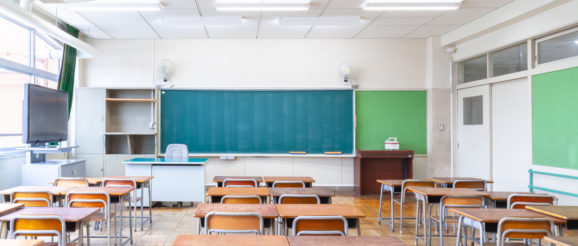How California Got Schooled On Innovation

Rest assured that the old political notion of “you never want a serious crisis to go to waste” is alive and thriving in California—even amidst a pandemic.
The proof?
United Teachers Los Angeles, the Southern California teachers’ union that’s long tried to stick a dagger in the heart of charter school expansion, suggested late last week that it wouldn’t be fair to approve any new charters at a time when the COVID-19 outbreak has Angelenos trapped indoors and thus unable participate in a governmental deliberation process.
The union also went a step further. In a letter reportedly sent to the Los Angeles school superintendent (as well as to California governor Gavin Newsom), it called for a halt to any new agreements allowing a charter school to share space with a district-operated space (a right charters current enjoy under existing state law).
So there you have it—the coronavirus is bad for your health, and bad for flexibility in public education.
I wouldn’t call UTLA’s latest run at charter schools “innovative,” in that it’s a tired refrain from an outfit that fears competition and accountability. But it does beg the question of who’s adapted to these changed times, as well as what entities are making the most of the moment to improve the lives of Californians. (As for the quote in the lead paragraph, it came from a former White House chief of staff lamenting that in times of emergency—his example being the 1970s oil embargo/shock—Washington missed out on a chance to concoct a national energy plan).
So who’s being innovative in California these days?
Let’s start with who’s not: the brain trust that designed and operates the State of California’s web portal. A thin banner atop the home page offers this link to COVID-19 guidance. But it doesn’t leap out at you—not as much as the other enticers further down on the home page: fire information (not exactly a pressing spring concern in a soggy California), filing for unemployment (yes, a pressing concern in a state with a million new unemployment claims), disaster relief, and road conditions. By the way, don’t make the same mistake I did of typing “coronavirus” into the portal’s main search engine—I received nearly 76,000 hits as of Wednesday).
Speaking of road conditions, are state and local officials taking advantage of vacated thoroughfares to do some needed paving and pothole repairs? (I raise this selfishly as a Silicon Valley motorist who’s tired of driving along a rutted and worn-down El Camino Real that punishes tires and wheel alignments.)
So back to California innovation and a sector doing the heroic: biotech.
Last week, two San Diego biotech companies, Arcturus Therapeutics and Inovio Pharmaceuticals, were hailed for their coronavirus vaccine research. The former is working on an easy-to-manufacture single-shot vaccine. The latter firm manufactured and tested a vaccine that will begin human clinical trials this month.
Also innovative—though it’s more compassionate than it is heroic: Uber Eats.
The food-delivery service (not surprisingly, its business is decidedly up with Californians stuck at home), has handed out free food and drink to hospital workers and medical personnel and is suspending delivering fees for some 100,000 independent restaurants nationwide. One wonders what state government will do to counter the need for more gig workers amidst the health crisis, given its predilection to kick the likes of Uber to the curb as my colleague Lee Ohanian brilliantly explains.
A third source of innovation, taking us back to public education in California’s Southland: the Los Angeles school chief’s reaction to a pandemic that’s closed California public schools at least until May 1.
Austin Beutner, the Los Angeles Unified School District’s superintendent for nearly two years now, is not to be confused with a run-of-the mill “educrat.” His roundabout path to stewardship of America’s second-largest public school system includes stops at the Blackstone Group (he became a partner in the investment firm at age 29), as a cofounder of investment banker Evercore Partners, as a Clinton administration appointee (converting Russia to a free-market economy), as the first deputy mayor of Los Angeles (managing port operations, water, and power, as well as housing), and, in a brief stint, as publisher and CEO of the Los Angeles Times (not long after Beutner and a team of local investors had tried to purchase the struggling paper).
How did a nonconformist school superintendent react to an unprecedented crisis facing Los Angeles?
First, Beutner partnered with three public broadcasting stations (KCET, KLCS, PBS SoCal) to offer student-centered programming 12 hours a day (7 a.m. to 7 p.m.) every weekday—the first such arrangement in the nation (30 other states have followed suit). The fare includes the science show NOVA, the animated science show for preschoolers Peg + Cat, American Masters, the reading-instructive Martha Speaks, Shakespeare Uncovered, and Sesame Street.
Second, Beutner arranged food centers to serve meals every day at 64 locations countywide. Last Friday, 438,000 meals were served (plus another 1,500 at temporary homeless shelters), up from 260,000 meals a few days earlier. The LA Unified School District also donated 100,000 N95 masks it had purchased before the health emergency to local hospitals.
Third, Beutner ordered a $100 million emergency investment in laptops and tablets and training for teachers, students, and their families. A first-in-the nation deal with Verizon allows LAUSD to provide free internet access to students who don’t otherwise have it (an estimated 100,000 students in the district don’t have home internet access).
One other improvement that the state government’s tech designers should notice: the home page of the Los Angeles school district’s web portal is dominated by information on where to find food centers, plus information on at-home learning and breaking news. In other words, the material that matters most is at the ready.
Wasteful, it’s not. In Los Angeles, it would seem, a serious crisis didn’t go to waste.
